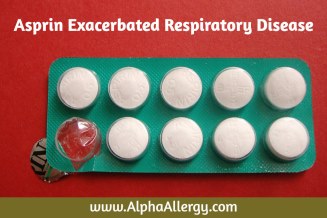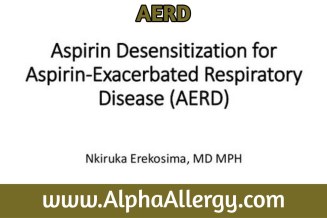AERD (Asthma Exacerbated Respiratory Disease), also known as “Samter’s Triad”, “Triad Asthma”, “Aspirin-Induced Asthma” (or “Aspirin Asthma”), is a disease of the respiratory system characterized by the co-occurrence of :
- Asthma
- Chronic Sinus Inflammation with Nasal Polyps
- Acute respiratory allergic reaction to Aspirin & other COX-1 inhibiting NSAIDs (Non Steroidal Anti-Inflammatory Drugs)
COX1 inhibitors include  such drugs as Aspirin, Ibuprofen (Motrin IB®, Midol IB®,or Advil®), and Naproxen (Aleve®). Some other medicines – like a few of the Excedrin ® and Alka-Seltzer® brand products – also contain aspirin and are likely to trigger a respiratory reaction in some people.
such drugs as Aspirin, Ibuprofen (Motrin IB®, Midol IB®,or Advil®), and Naproxen (Aleve®). Some other medicines – like a few of the Excedrin ® and Alka-Seltzer® brand products – also contain aspirin and are likely to trigger a respiratory reaction in some people.
For individuals with AERD, even some non-Aspirin medications may cause similar problems.
According to one of our local allergy specialists, Dr. Nkiruka Erekosima, Tylenol® (acetaminophen) “is considered a weak COX-1 inhibitor, so some individuals with AERD may have a similar reaction to Tylenol® – at high doses – as they would to Aspirin”.
Prevalence of AERD
Here are some statistics around the prevalence of AERD. Individuals with AERD make up:
- Approximately 7% of all individuals with asthma
- About 15 % of patients with severe asthma
- About 30% of asthmatics with nasal polyps, and …
- Approximately 10% of patients with nasal polyps or chronic sinusitis.
The American Academy of Allergy, Asthma and Immunology (AAAAI) notes that the rate of AERD prevalence in individuals with severe asthma is high enough that doctors should investigate those patients’ experience with taking aspirin (or other NSAIDs) at every new consultation with such individuals.
AERD Diagnosis & Management
A clinical diagnosis of AERD requires a diagnostic aspirin challenge, best performed under the observation of an allergist and staff who are trained to handle any potential side effects. In a diagnostic aspirin challenge, our patient takes a very small dose of aspirin while we carefully observe them for any signs of an allergic reaction.
Depending on the particular details of an individual patient’s situation, managing AERD typically involves some or all of the following, :
- NSAID Avoidance – Avoidance of Aspirin and other medicines that may trigger an acute reaction.
- Medications – Control and rescue medication for the treatment of asthma.
- Polyp Surgery (Polypectomy) – Removal of nasal polyps to alleviate nasal symptoms.
- Aspirin Desensitization – Allows patients to tolerate aspirin (temporarily) after the procedure, and for as long as they continue the Aspirin (or NSAID) daily to maintain the desensitized state. More about aspirin desensitization.
Aspirin Exacerbated Respiratory Disease
 Would you like to learn more about AERD?
Would you like to learn more about AERD?
Dr. Erekosima presented information to some of the physician members of the Montgomery County Medical Society (MCMS) on this condition, and we’ve made that presentation available here.
[You can download it by pointing your mouse on the graphic on the left, then “right click”, and select “Save As” or “Save Link As” (depending on your browser) and then Save it to a preferred location on your device.]
At our Montgomery County, MD allergist practice, we support our patients in the diagnosis, consultation and treatment (Aspirin Desensitization) of AERD/Samter’s triad or Aspirin sensitivity.
Do You Need These Services? Get In Touch.
Aspirin desensitization & AERD treatment